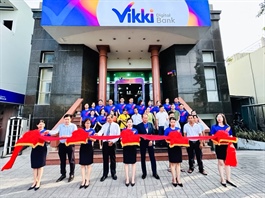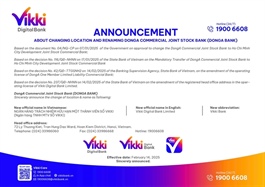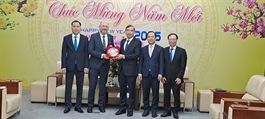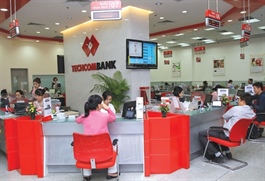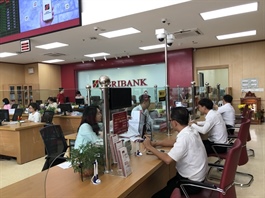Banks firm on green growth trajectory
Banks firm on green growth trajectory
Vietnam’s financial and banking sector remains steadfast in its commitment to green development amid the withdrawal of numerous international financial institutions from net-zero initiatives due to concerns over political changes in the United States.
On January 31, the Royal Bank of Canada announced its withdrawal from the Net Zero Banking Alliance (NZBA) following the departure of several of the country’s major banks, including TD, Montreal, the National Bank of Canada, and the Canadian Imperial Bank of Commerce.
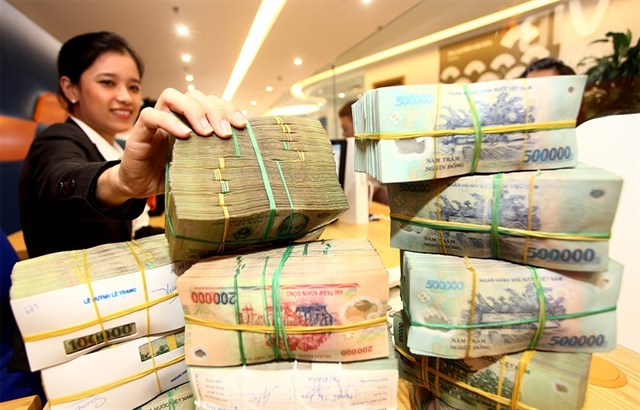
Banks firm on green growth trajectory |
The decision by the banks comes amid a wave of exits from the NZBA by major US financial institutions after JPMorgan Chase announced its departure on January 7, making it the last of the six largest US banks to leave the climate alliance.
JPMorgan Chase’s departure marked the conclusion of a series of US bank withdrawals within a month, as American financial giant Morgan Stanley followed in the footsteps of Citigroup, Bank of America, Goldman Sachs Group, and Wells Fargo in December, which exited the NZBA just days earlier.
The abrupt exit of major global banks came just before Donald Trump’s return as US president. He criticised the previous administration’s efforts to impose climate change policies, with the banking moves partly reflecting the influence of the political situation on the changes.
As a result, major banks and corporations are increasingly cautious in making any moves to avoid conflict with the new administration, raising concerns about the role and responsibility of the banking sector in the fight against climate change.
“We will continue to work independently to advance the interests of our company, shareholders, and clients while remaining focused on practical solutions to help drive low-carbon technologies while promoting energy security,” said a representative from JPMorgan in a statement announcing its withdrawal from the NZBA. “We will also continue to support the banking and investment needs of clients engaged in energy transition and decarbonisation efforts across various sectors of the economy.”
At the same time, the US Federal Reserve announced its withdrawal from the Network for Greening the Financial System on January 17.
The Republican Party had previously expressed scepticism about climate risk management in the banking sector. Stephen Miran, who was appointed by President Trump as the White House’s top economic advisor, publicly criticised the Federal Reserve last year for overstepping its mandate by considering climate change factors in banking regulations.
Dinh Duc Quang, head of Global Markets at UOB Vietnam, noted that the new president had consistently pushed for lower oil prices, seeing the US economy as reliant on traditional fuels.
“Lower fuel costs would boost US manufacturing competitiveness while strengthening America’s role as a key energy exporter, independent of the Middle East and Russia. If Europe stops buying Russian fuel, the US can fully replace that supply. This shift explains the withdrawal from net-zero commitments to prioritise domestic energy investments,” added Quang.
These consecutive withdrawals by international financial institutions and banks raise concerns about the abandonment of climate and environmental, social, and governance (ESG) commitments in the global banking sector. In response to this challenge, Vietnamese banks remain committed to developing green banking.
In an interview with VIR, Suan Teck Kin, research head and executive director of Global Economics and Markets Research at UOB, emphasised that Vietnam’s financial-banking sector must remain steadfast in its ESG goals and net-zero commitments.
“The United States policy direction leans towards traditional energy sources like coal and oil. Over the next four years, we may see a decline in net-zero commitments and green financing from the US. However, this does not mean Vietnam should follow suit. In Vietnam, we must take the right actions to protect our future,” he said.
Kin cited China and India as examples, noting that both countries have significant green energy resources with large production capacities. This means that when India and China face disruptions in oil and gas supplies, they can maintain energy self-sufficiency and secure their energy needs.
“Vietnam should also follow this path, continuing to develop these energy sources to ensure national security and stability,” he added.
Meanwhile, earlier in 2025, HDBank announced the successful issuance of $125 million in green bonds, voluntarily adhering to the issuance principles set by the International Capital Market Association and the Loan Market Association.
According to the bank, the capital raised from green bonds will be used to finance projects that meet the standards outlined in HDBank’s Sustainable Finance Framework, contributing to environmental protection and creating a green economy.
Agribank also allocated $417 million for a green credit programme offering loans to individual customers at an interest rate as low as 3.5 per cent per annum, valid until June 30. This will support preferential lending for green projects that contribute to environmental protection, energy savings, renewable energy, and clean technology.
Assoc. Prof. Phan Quang Tuan, director and representative of the University of Hong Kong in Vietnam, suggested that local authorities and regulatory bodies should invest in personnel for green finance and ESG. These fields require experts with deep expertise in green bonds, carbon credits, and sustainable investment instruments.
“Vietnam could send officials to participate in the Singapore Green Finance Centre programme, offering specialised courses to meet the rising demand for green finance professionals in ASEAN. Alternatively, Vietnam could engage in research initiatives, seminars, and specialised training conducted by the European Investment Bank and Green Finance Institute to standardise knowledge and skills in green finance,” Tuan said.








